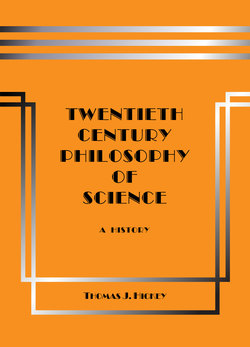Читать книгу Twentieth-Century Philosophy of Science: A History (Third Edition) - Thomas J. Hickey - Страница 64
На сайте Литреса книга снята с продажи.
3.33 Computational Philosophy of Science
ОглавлениеComputational philosophy of science is the development of computerized discovery systems that can proceduralize explicitly the past achievements of successful scientists, and then apply the successfully mechanized procedures to the current state description of a science to develop a new state description containing one or several new and superior theories.
The discovery systems created by the computational philosopher of science represent diachronic dynamic metalinguistic analyses. They proceduralize a transitional process explicitly with the computerized system design, in order ultimately to accelerate the contemporary advancement of a science by mechanizing a transitional procedure. Then by applying the system to the current state description for the science they generate new theories. The discovery systems typically include empirical criteria for selecting a subset of the generated theories for output as tested and nonfalsified theories either for further predictive testing or for use as laws in explanations and test designs.
The computer is here to stay, and in this computer age computational philosophy of science is inevitable. The exponentially growing capacities of computer hardware and proliferation of computer-systems designs have already been enhancing the technical practices of basic-scientific research in many sciences, and philosophy of science cannot escape such developments. Presently few philosophy professors have the needed competencies to contribute to computational philosophy of science. And thus few curricula in philosophy departments encourage much less actually prepare students for contributing to this new and emerging area in philosophy of science. Computational philosophy of science will achieve ascendancy in twenty-first-century philosophy of science due to those who are opportunistic enough to master both the necessary system-development skills and the requisite working competencies in an empirical science. Lethargic and/or reactionary academics that dismiss it are fated to spend their careers evading it, as they are progressively marginalized.
In the “Introduction” to their Empirical Model Discovery and Theory Evaluation: Automatic Selection Methods in Econometrics (2014) David F. Hendry and Jurgen A. Doornik of Oxford University’s Program of Economic Modeling at their Institute for New Economic Thinking write that automatic modeling has indeed “come of age.” Hendry was head of Oxford’s Economics Department from 2001 to 2007, and is presently Director of the Economic Modeling Program at Oxford’s Martin School. And Doornik is a colleague at the Institute. These authors have developed a mechanized general-search algorithm they call AUTOMETRICS for determining the equation specifications for econometric models.
Our twenty-first century perspective shows that notwithstanding obstructionism by latter-day Luddites, computational philosophy of science has indeed “come of age”. It is the future that has arrived, even when it is called by other names as practiced by scientists working in their special fields instead of being called “metascience” or “computational philosophy of science”.
